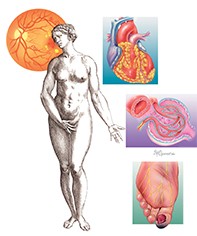Peer Reviewed
Feature Article Endocrinology and metabolism
Reducing the complications of type 2 diabetes: challenges in individualising care
Abstract
Individualised complementary lifestyle and pharmacological therapies in people with diabetes increase the challenge of caring for these patients but should reduce complications such as cardiovascular disease, chronic kidney disease, the diabetic foot and retinopathy.
Key Points
- The complications of type 2 diabetes can be reduced by intensive treatment of all of hypertension, dyslipidaemia and hyperglycaemia, as well as cessation of smoking.
- Optimal care of people with diabetes is highly complex, requiring the identification of high-risk patients and individualised treatment approaches and goals.
- Tools are available for assessing risks of cardiovascular disease and diabetic kidney disease.
- Routine examination of the feet identifies patients at high risk of a foot ulcer and possible amputation.
- Annual diabetic retinopathy screening is recommended from the time of diagnosis with type 2 diabetes.
- Attention to psychological aspects of diabetes increases adherence to lifestyle advice and medications, reducing complications.
Purchase the PDF version of this article
Already a subscriber? Login here.

